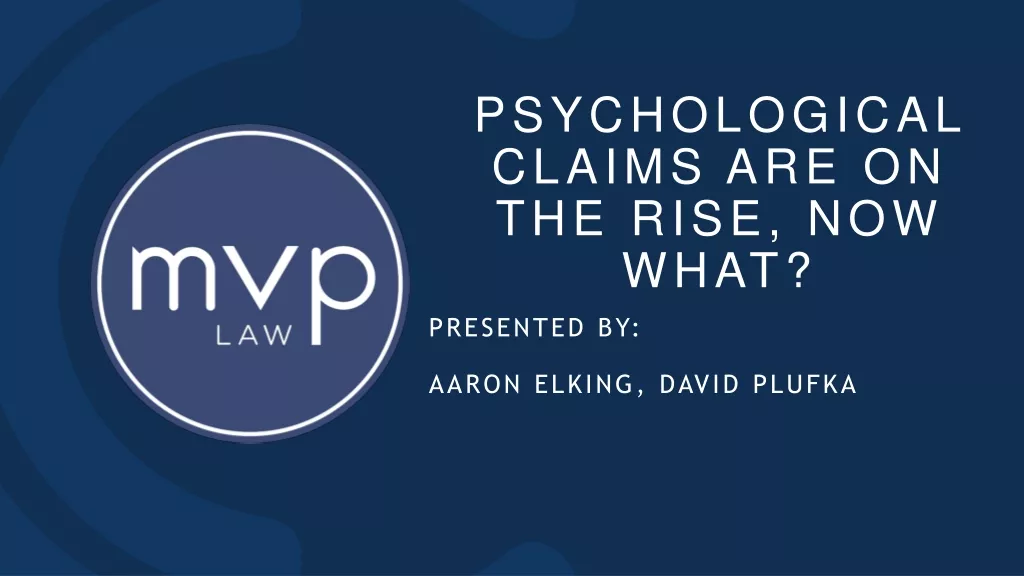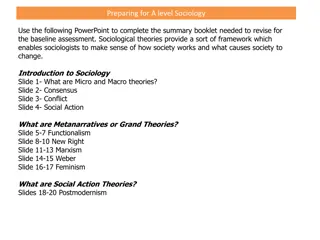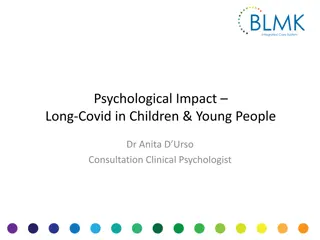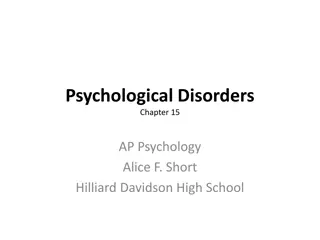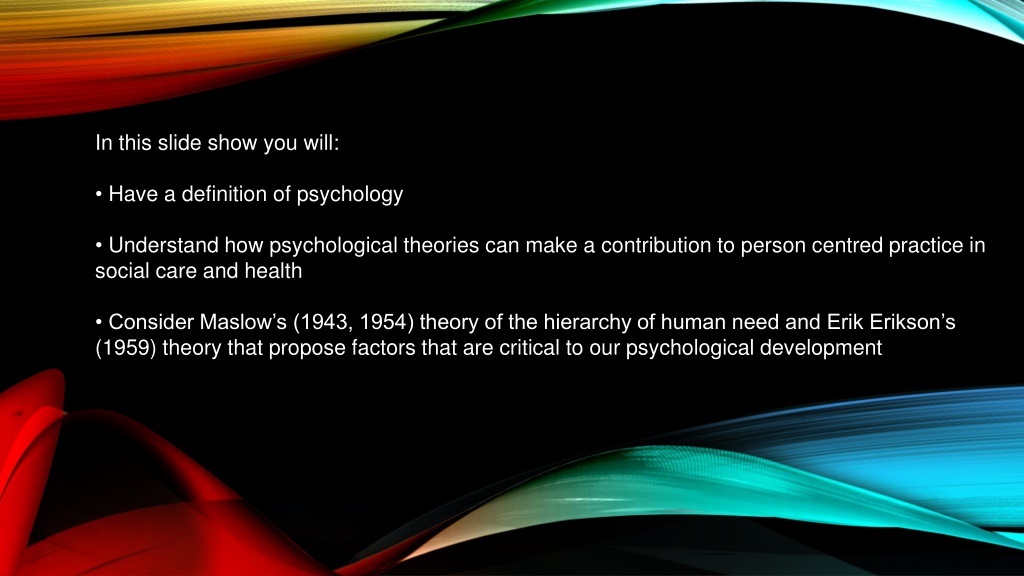
Psychological Theories Contribution to Person-Centered Care
Explore how psychological theories, such as Maslow's hierarchy of needs and Erikson's developmental theory, can enhance person-centered practice in social care and health. Learn how these theories provide insights into human behavior, relationships, and well-being, guiding support and interventions for individuals facing various challenges.
Download Presentation

Please find below an Image/Link to download the presentation.
The content on the website is provided AS IS for your information and personal use only. It may not be sold, licensed, or shared on other websites without obtaining consent from the author. If you encounter any issues during the download, it is possible that the publisher has removed the file from their server.
You are allowed to download the files provided on this website for personal or commercial use, subject to the condition that they are used lawfully. All files are the property of their respective owners.
The content on the website is provided AS IS for your information and personal use only. It may not be sold, licensed, or shared on other websites without obtaining consent from the author.
E N D
Presentation Transcript
In this slide show you will: Have a definition of psychology Understand how psychological theories can make a contribution to person centred practice in social care and health Consider Maslow s (1943, 1954) theory of the hierarchy of human need and Erik Erikson s (1959) theory that propose factors that are critical to our psychological development
Definition of psychology Psychology is the scientific study of people, the mind and behaviour this includes observation and experiment to describe and explain phenomena (the what that goes on in people s lives in terms of events and experiences that influence them). Zimbardo et al. 2014 The British Psychological Society 2017
Psychological theories can make a contribution to person centred practice in social care and health because they: Provide an understanding of influences on people s thoughts and feelings that give insights into their behaviour including their relationships and attachments Help us to identify support that can help individuals deal with challenging human experiences including abuse, neglect, grief and other forms of pain Enable us to recognise that individuals beliefs, perceptions and experiences vary requiring an equally varied response to their psychological needs
Psychological theories can make a contribution to person centred practice in social care and health because they: Link with other factors that influence people s lifestyle (think of the biopsychosocial model) behaviours, e.g. substance misuse which causes harm to individuals and has repercussions for their relationships with others Propose possible therapies, treatments and approaches (which could be included in care and support plans) to support resilience and wellbeing
Zimbardo et al. 2014(p.49) present six main psychological perspectives. (Fig. 4 in their eBook provides full detail.) 1. Biological perspective nervous system and physical characteristics 2. Behavioural perspective learning and behaviour 3. Development perspective changes in our individual psychology across our lifespan
Zimbardo et al. 2014(p.49) present six main psychological perspectives. (Fig. 4 in their eBook provides full detail.) 4. Cognitive perspective focus on mental processes such as thought, memory and perception (personal view of the world) 5. Whole person perspective includes different views such as the humanistic view which emphasises human potential 6. Sociocultural perspective social influences on human behaviour and cultural differences
Whole- person psychological perspective - Theorists: Abraham Maslow (1943, 1954) theory of hierarchy of human need and the pursuit of self-actualisation There is also Carl Rogers (1961) person centred approach who applied his work to psychotherapy and education including work with disadvantaged families and their children, but we will focus on Maslow s (1943, 1954) theory of hierarchy of human need for today.
Whole-person psychological perspective Maslow (1943,1954) This is a motivational theory based on an optimistic perspective of human nature. There is a belief that our inner nature possesses a motivation for growth and actualisation (a sense of being fulfilled and being at peace with oneself). Maslow (1943,1954) focuses on spiritual (as in the human spirit) aspects of humanity.
SUMMARY OF MASLOWS (1943, 1954) HIERARCHY OF HUMAN NEED This theory provides a person centred and holistic view of an individual and it proposes that lower basic level needs (i.e. biological and physical needs) have to be met before moving on to higher level needs which can ultimately lead to self-actualisation, i.e. personal growth and fulfilment. There is a focus on working with the person to recognise that any change that they make has consequences for other areas of their life across any of the levels of human need this is relevant to inclusive assessments of need and a holistic approach.
SUMMARY OF MASLOWS (1943, 1954) HIERARCHY OF HUMAN NEED Emphasis is placed on the importance of self-awareness including one s experiences and interactions with others this makes explicit links between emotional and physical wellbeing. There is an assumption that problems arise when an individual is prevented from fulfilling his or her potential because they are inhibited in some way across their different needs .
ERIK ERIKSON (1959) DEVELOPMENT PSYCHOLOGICAL PERSPECTIVE - MAIN ASPECTS OF THIS THEORY: 1. We form basic beliefs about ourselves and the world around us at an unconscious (this means that we are unaware) level and these beliefs influence our psychological development. 2. These beliefs develop out of a crisis that can be resolved successfully or remain unresolved at critical stages in our personal development.
ERIK ERIKSON (1959) DEVELOPMENT PSYCHOLOGICAL PERSPECTIVE - MAIN ASPECTS OF THIS THEORY: 3. Erikson identified eight psychosocial stages in his development theory as a choice between two opposing beliefs, e.g. trust and mistrust his theory is that there are critical stages in our life where what happens then (i.e. the inability to resolve opposing beliefs) has the potential to influence our future self esteem and life outcomes. The eight stages are identified in the next slide.
ERIKSON (1959) DEVELOPMENT THEORY Stage Lifespan period Crisis Virtue (resolution) Psychological benefit (conflict/opposing beliefs) 1 Infancy (0 to 1.5 years) Trust vs. mistrust Hope Feeling secure 2 Infancy (1.5-3 years) Autonomy vs. shame and doubt Will Positive self- determination 3 3-5 years Initiative vs. guilt Purpose Balance between assertion and restraint 4 5-12 years Industry (competence) vs. inferiority Competence Self-confidence 5 12-18 years Identity vs. role confusion Fidelity Being true to oneself 6 18-40 years Intimacy vs. isolation Love Close and positive relationships 7 40-65 years Generativity vs. stagnation Care Positive wellbeing and care of oneself and others 8 Over 65 years of age Ego integrity vs. despair Wisdom Ability to look back at one s life with a sense of accomplishment
SUMMARY OF ERIKSONS (1959) THEORY The development stages encourage us to consider our lifespan and how events and experiences at critical stages within in it may have influenced our current outlook, decisions and behaviours including our responses to adversity. Similar to Maslow s (1943, 1954) hierarchy of human need this theory encourages a holistic approach to understanding human psychology by encouraging us to consider a person in their entirety as opposed to solely the person here and now so that appropriate links can be made to broader elements of the individual s life.
RELEVANCE OF PSYCHOLOGICAL THEORIES (MASLOW, 1943, 1954; ERIKSON, 1959) TO SUPPORT PERSON CENTRED PRACTICE These are psychological theories that encourage a holistic approach to individuals by relating our experiences of interactions with others (e.g. early childhood and adulthood) and our access to resources (e.g. food, water, shelter) to our psychological wellbeing. There is a focus on identifying how different elements of our lives (needs or/and lifespan experiences) influence each other to contribute towards our sense of wellbeing and resilience.
References Ingleby, E. (2010) Applied psychology for social work. Second edn. Exeter: Learning Matters. Dawsonera [Online]. Available at: https://www.dawsonera.com (Accessed: 30 September 2017). The British Psychological Society (2017) The British Psychological Society [Online]. Available at: http://www.bps.org.uk/ (Accessed: 30 September 2017). Zimbardo, P., Johnson, R., McCann Hamilton, V. (2014) Psychology: core concepts. Seventh edition. Harlow : Pearson Education. Dawsonera [Online]. Available at: https://www.dawsonera.com (Accessed: 30 September 2017).


